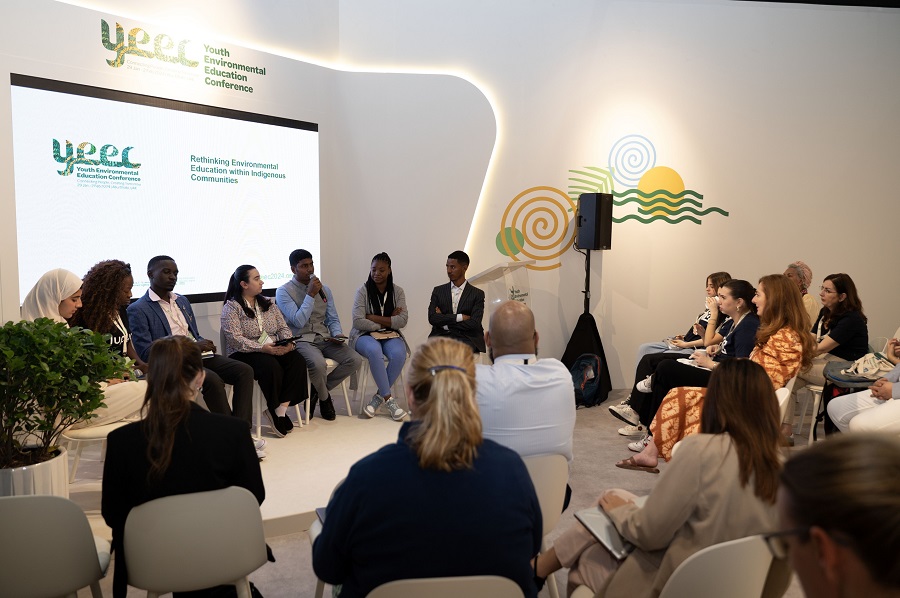
Abu Dhabi, 31 January 2024 – Day Two of the 12th World Environmental Education Congress (WEEC2024) at the Abu Dhabi National Exhibition Centre (ADNEC) built upon an inspiring first day, focusing on the forming of goals and providing a platform for global participants to shape transformative change through environmental education. The day brought together a diverse network of participants for engaging workshops and interactive panel discussions, continuing the momentum established on Day One and addressing the central challenges identified.
Day 2 began with Plenary 3 of the five-day gathering, in which three distinguished speakers shared thoughts on the crucial requirement for a united global approach when fostering education to address sustainability.
Eureta Rosenberg, Dean of Education; Research Chair in Environment and Sustainability Education, Rhodes University, South Africa, underlined the importance of evaluation as an integral part of impactful Environmental Education (EE) and Education for Sustainable Development (ESD) in this time of crisis. Highlighting the now critical state of the earth system, she said: “EE/ESD is essential if we are going to learn how to address our complex environmental challenges,” adding that both funders and implementers are calling for evaluation, because they want to know whether EE/ESD programmes are making a difference, and achieving what they set out to achieve. However, Rosenberg cautioned that: “Mainstream evaluation instruments are often inappropriate for the longer-term, open-ended and non-linear pathways to societal change through education. The wrong evaluation tools can derail, undermine or mis-direct good programmes”. She shared that educators are experimenting with methods that are able to evaluate open-ended processes, EE/ESD principles, and the underlying mechanisms of change. Rosenberg invited WEEC delegates to collaborate in synthesising the outcomes of evaluative cases studies of EE/ESD across the globe, so that: “We can collectively build up a picture of the many ways in which our educational efforts are already making a significant contribution to sustainability, and how we can further improve.”
In a compelling video address at the plenary, Akpezi Ogbuigwe, Regional Advisor for Africa, UNU/RCE Chair; Council of Earth Charter International, Costa Rica stressed the need for a renewed and urgent wake-up call to step up EE, underscoring this urgency for worldwide collaboration.
In the second keynote session of Day Two, Plenary 4 addressed the relationship that emotions and ethics have with EE, underscoring the roles they have in humanity’s approach to confronting climate change. Nujoom al Ghanem, Emirati Poet, Artist and Film Director, UAE, gave an inspiring speech highlighting the opportunity the arts industry has to create emotive incentives to drive behavioural change. “A sector which cannot be underestimated, the arts have a unique opportunity – and responsibility – to evoke emotion, educate, and form connections which will help inspire the transformative change we need for a more sustainable world.”
Rohan Chakravarty, Artist, Cartoonist, Illustrator and Naturalist, India, echoed the sentiment in an inspiring speech, which highlighted the significance of harnessing emotions through art to drive change.
Running in parallel to the plenaries, a series of workshops took place across Day Two that addressed how the Triple Planetary Crisis can be tackled. In vital information sharing sessions, topics of note included the opportunities and challenges for environmental teaching within early childhood education, how AI and smart technology can be harnessed for climate education, the gaps and opportunities in climate change education and policies, and the value of indigenous communities in promoting environmental knowledge. In other sessions, delegates discussed how outdoor and place-based learning presents a compelling opportunity for hands-on learning, highlighting the scope for creative and non-classroom-based learning and the heightened emotional connection, and therefore social responsibility, that it can foster.
Empowering the environmental ambassadors of tomorrow, the Youth Environmental Education Conference (YEEC) is running concurrently to WEEC2024. Day Two’s sessions included an inspiring masterclass led by Dr. Shepherd Urenje, a Programme Specialist in Sustainability Education with the Centre for Research and Education on Learning for Sustainable Development and Global Health (SWEDESD) at Uppsala University, Sweden, who stated: “Environmental Education has the potential to set in motion the power of creative thinking in young people. In doing so, we support and grow relevant skills that will help them cope with an ever-changing world. This education engages youth in activities that trigger critical thinking and innovation, providing them with learning tools to develop essential competencies in environment and sustainability education.” In a showcase of the world’s best youth-led innovations, the session aimed to offer a dose of inspiration to young participants and nurture relevant skills to cope in an ever-changing world.
Following the necessary changes set out in Day One, Day Two enabled discussions around shaping the goals to influence change. Day Three will investigate the ‘dimensions and means’ shining a spotlight on collaboration, values, and cultural diversity and will begin setting out a roadmap strategy. Day Four will summarise the key learnings, and takeaways and translate them into agreed actions that will be implemented beyond the event to align with the identified goals. The fifth and last day of the congress will feature a series of field trips, inviting participants to explore Abu Dhabi's ecological and educational sites, seamlessly integrating theory into hands-on experiences.
Those interested can register online or at the venue in Abu Dhabi until 1 February 2024. WEEC 12 | Registration (weec2024.org)
